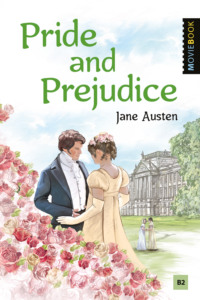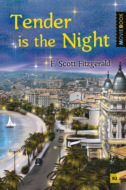Kitabı oku: «Pride and Prejudice / Гордость и предубеждение», sayfa 5
Chapter 16
The next evening the coach took Mr. Collins and his five cousins to Meryton; and the girls had the pleasure of hearing, as they entered the drawing-room, that Mr. Wickham had accepted their uncle's invitation, and was then in the house.
When this information was given, and they had all taken their seats, Mr. Collins looked around him and he was so much struck with the size and furniture of the apartment, that he declared it was like the small summer breakfast parlour at Rosings. When Mrs. Phillips understood from him what Rosings was, and who was its proprietor – when she had listened to the description of only one of Lady Catherine's drawing-rooms, and found that the chimney-piece alone had cost eight hundred pounds, she felt all the force of the compliment.
In describing to her all the grandeur of Lady Catherine and her mansion, with occasional digressions in praise of his own humble dwelling, he was happily employed until the gentlemen joined them; and he found in Mrs. Phillips a very attentive listener, whose opinion of his consequence increased with what she heard. To the girls, who could not listen to their cousin, the interval of waiting appeared very long. It was over at last, however. The gentlemen did approach, and when Mr. Wickham walked into the room, Elizabeth felt some unreasonable admiration.
Mr. Wickham was the happy man towards whom almost every female eye was turned, and Elizabeth was the happy woman by whom he finally seated himself. The agreeable manner in which he immediately fell into conversation, though it was only on its being a wet night, made her feel that the commonest, dullest topic might be rendered interesting by the skill of the speaker.
When the card-tables were placed, Mr. Collins sat down to whist81.
Mr. Wickham did not play at whist, and with ready delight was he received at the other table between Elizabeth and Lydia. Allowing for the common demands of the game,82 Mr. Wickham could at leisure talk to Elizabeth, and she was very willing to hear him, though what she chiefly wished to hear she could not hope to be told – the history of his acquaintance with Mr. Darcy. She dared not even mention that gentleman. Her curiosity, however, was unexpectedly relieved. Mr. Wickham began the subject himself. He inquired how far Netherfield was from Meryton; and, after receiving her answer, asked in a hesitating manner how long Mr. Darcy had been staying there.
“About a month,” said Elizabeth, and then added, “He is a man of very large property in Derbyshire, I understand.”
“Yes,” replied Mr. Wickham; “his estate there is a noble one. A clear ten thousand per annum.83 I can give you certain information on that subject for I have been connected with his family in a particular manner from my infancy.”
Elizabeth looked surprised.
“Then you may be surprised, Miss Bennet, after seeing the very cold manner of our meeting yesterday. Are you much acquainted with Mr. Darcy?”
“I have spent four days in the same house with him, and I think him very disagreeable.”
“I have no right to give my opinion,” said Wickham, “as to his being agreeable or otherwise. I have known him too long and too well to be a fair judge. But I believe your opinion of him would in general astonish – and perhaps you would not express it quite so strongly anywhere else. Here you are in your own family.”
“Upon my word, I say no more here than I might say in any house in the neighbourhood, except Netherfield. He is not at all liked in Hertfordshire. Everybody is disgusted with his pride.”
“I cannot pretend to be sorry,” said Wickham, after a short interruption, “that he or that any man should not be estimated beyond their deserts84; but with him I believe it does not often happen. The world is blinded by his fortune and consequence, or frightened by his imposing manners, and sees him only as he chooses to be seen.”
“I took him, even on my slight acquaintance, to be an ill-tempered man.” Wickham only shook his head.
“I wonder,” said he, at the next opportunity of speaking, “whether he is likely to be in this country much longer.”
“I do not at all know; but I heard nothing of his going away when I was at Netherfield. I hope your plans to stay here will not be affected by his being in the neighbourhood.”
“Oh! No – it is not for me to be driven away by Mr. Darcy. If he wishes to avoid seeing me, he must go. We are not on friendly terms, and it always gives me pain to meet him, but I have no reason for avoiding him but what I might proclaim before all the world, a sense of very great ill-usage,85 and most painful regrets at his being what he is. His father, the late Mr. Darcy, was one of the best men that ever breathed, and the truest friend I ever had. But his son's behaviour to myself has been scandalous; however I believe I could forgive him anything and everything, rather than his disappointing the hopes and disgracing the memory of his father.”
Elizabeth found the interest of the subject increase, and listened with all her heart; but the delicacy of it prevented further inquiry.
Mr. Wickham began to speak on Meryton, the neighbourhood, the society, appearing highly pleased with all that he had yet seen, and speaking of the latter with gallantry.
“Society, I admit, is necessary to me. I have been a disappointed man, and my spirits will not bear solitude.
I must have employment and society. A military life is not what I was intended for. I was brought up for the church, and I should at this time have been in possession of a most valuable living, if it had pleased the gentleman we were speaking of just now.”
“Indeed!”
“Yes – the late Mr. Darcy bequeathed me the best living86 in his gift. He was my godfather, and excessively attached to me. He meant to provide for me sufficiently, and thought he had done it; but when the living fell, it was given elsewhere.”
“Good heavens!” cried Elizabeth; “but how could that be? How could his will be disregarded? Why did you not seek legal redress?”87
“There was just such an informality in the terms of the bequest as to give me no hope from law. A man of honour could not have doubted the intention, but Mr. Darcy chose to doubt it, and declared that I had lost all claim to it by extravagance, imprudence – in short anything or nothing. Certain it is, that the living became vacant two years ago, and that it was given to another man; and no less certain is it, that I cannot accuse myself of having really done anything to deserve to lose it. I have an unguarded temper88, and I may have spoken my opinion of 'him, and to him, too freely. I can recall nothing worse. But the fact is, that we are very different sort of men, and that he hates me.”
“This is quite shocking! He deserves to be publicly disgraced.”
“Some time or other he will be – but not by me. Till I can forget his father, I can never expose him.”
Elizabeth honoured him for such feelings, and thought him handsomer than ever as he expressed them.
“But what,” said she, after a pause, “can have been his motive? What can have induced him to behave so cruelly?”
“A thorough, determined dislike of me – a dislike which I attribute in some measure to jealousy. His father's uncommon attachment to me irritated him, I believe, very early in life. He had not a temper to bear the sort of competition in which we stood – the sort of preference which was often given me.”
“I had not thought Mr. Darcy so bad as this – though I have never liked him. I had not thought so very ill of him. I had supposed him to be despising his fellow-creatures in general, but did not suspect him of descending to such malicious revenge, such injustice, such inhumanity as this.”
Elizabeth was deep in thought, and after a time exclaimed, “To treat in such a manner the godson, the friend, the favourite of his father!”
“We were born in the same parish, within the same park; the greatest part of our youth was passed together. My father gave up everything to be of use to the late Mr. Darcy and devoted all his time to the care of the Pemberley property. He was most highly esteemed by Mr. Darcy, a most intimate, confidential friend. Mr. Darcy often acknowledged himself to be under the greatest obligations to my father's active superintendence, and when, immediately before my father's death, Mr. Darcy gave him a voluntary promise of providing for me, I am convinced that he felt it to be as much a debt of gratitude to him, as of his affection to myself.”
“How abominable!” cried Elizabeth. “I wonder that the very pride of this Mr. Darcy has not made him just to you!”
“It is wonderful,” replied Wickham, “for almost all his actions may be traced to pride; and pride had often been his best friend. It has connected him nearer with virtue than with any other feeling.”
“Can such abominable pride as his have ever done him good?”
“Yes. It has often led him to be liberal and generous, to give his money freely, to display hospitality, to assist his tenants, and relieve the poor. Family pride – for he is very proud of what his father was – has done this. Not to appear to disgrace his family, to degenerate from the popular qualities, or lose the influence of the Pemberley House, is a powerful motive. He has also brotherly pride, which, with some brotherly affection, makes him a very kind and careful guardian of his sister, and you will hear him generally described as the most attentive and best of brothers.”
“What sort of girl is Miss Darcy?”
He shook his head. “I wish I could call her amiable. It gives me pain to speak ill of a Darcy. But she is too much like her brother – very, very proud. As a child, she was affectionate and pleasing, and extremely fond of me; and I have devoted hours and hours to her amusement. But she is nothing to me now. She is a handsome girl, about fifteen or sixteen, and, I understand, highly accomplished. Since her father's death, her home has been London, where a lady lives with her, and superintends her education.”
After many pauses and many trials of other subjects, Elizabeth said:
“I am astonished at his intimacy with Mr. Bingley! How can Mr. Bingley, who is, I really believe, truly amiable, be in friendship with such a man? How can they suit each other? Do you know Mr. Bingley?”
“Not at all.”
“He is a sweet-tempered, amiable, charming man. He cannot know what Mr. Darcy is.”
“Probably not; but Mr. Darcy can please where he chooses. He can be a good companion if he thinks it worth his while. Among those who are his equals, he is a very different man from what he is to the less prosperous. His pride never deserts him; but with the rich he is liberal-minded, just, sincere, rational, honourable, and perhaps agreeable.”
The whist party soon afterwards broke up, the players gathered round the other table and Mr. Collins took his station between his cousin Elizabeth and Mrs. Phillips. The usual inquiries as to his success was made by the latter. It had not been very great; but when Mrs. Phillips began to express her concern, he assured her that it was not of the least importance.
“I know very well, madam,” said he, “that when persons sit down to a card-table, they must take their chances of these things, and happily I am not in such circumstances as to make five shillings any object. Thanks to Lady Catherine de Bourgh, I am removed far beyond the necessity of regarding little matters.”
Mr. Wickham's attention was caught; and after observing Mr. Collins for a few moments, he asked Elizabeth in a low voice whether her relation was very intimately acquainted with the family of de Bourgh.
“Lady Catherine de Bourgh,” she replied, “has very lately given him a living. I hardly know how Mr. Collins was first introduced to her notice, but he certainly has not known her long.”
“You know of course that Lady Catherine de Bourgh and Lady Anne Darcy were sisters; consequently that she is aunt to the present Mr. Darcy.”
“No, indeed, I did not. I knew nothing at all of Lady Catherine's connections. I never heard of her existence till the day before yesterday.”
“Her daughter, Miss de Bourgh, will have a very large fortune, and it is believed that she and her cousin will unite the two estates.”
This information made Elizabeth smile, as she thought of poor Miss Bingley. Vain indeed must be all her attentions, if he was already self-destined for another.
“Mr. Collins,” said she, “speaks highly both of Lady Catherine and her daughter; but from some particulars that he has related of her ladyship, I suspect his gratitude misleads him, and that in spite of her being his patroness, she is an arrogant, conceited woman.”
“I believe her to be both in a great degree,” replied Wickham; “I have not seen her for many years, but I very well remember that I never liked her, and that her manners were dictatorial and impudent. She has the reputation of being remarkably sensible and clever; but I rather believe she derives part of her abilities from her rank and fortune, part from her authoritative manner, and the rest from the pride for her nephew.”
Elizabeth and Mr. Wickham continued talking together, with mutual satisfaction till supper put an end to cards, and gave the rest of the ladies their share of Mr. Wickham's attentions. There could be no conversation in the noise of Mrs. Phillips's supper party, but his manners recommended him to everybody. Whatever he said, was said well; and whatever he did, done gracefully. Elizabeth went away with her head full of him. She could think of nothing but of Mr. Wickham, and of what he had told her, all the way home.
Chapter 17
Elizabeth related to Jane the next day what had passed between Mr. Wickham and herself. Jane listened with astonishment and concern; she knew not how to believe that Mr. Darcy could be so unworthy of Mr. Bingley's regard; and yet, it was not in her nature to question the honesty of a young man of such amiable appearance as Wickham. Nothing remained therefore to be done, but to think well of them both, to defend the conduct of each.
The two young ladies were summoned from the shrubbery, where this conversation passed, by the arrival of the very persons of whom they had been speaking; Mr. Bingley and his sisters came to give their personal invitation for the long-expected ball at Netherfield, which was fixed for the following Tuesday. The two ladies were delighted to see their dear friend again, and repeatedly asked what she had been doing with herself since their separation. To the rest of the family they paid little attention. They were soon gone again, rising from their seats with an activity which took their brother by surprise, and hurrying off as if eager to escape from Mrs. Bennet's civilities.
The prospect of the Netherfield ball was extremely agreeable to every female of the family. Mrs. Bennet chose to consider it as given in compliment to her eldest daughter, and was particularly flattered by receiving the invitation from Mr. Bingley himself, instead of a ceremonious card. Jane pictured to herself a happy evening in the society of her two friends, and the attentions of their brother; and Elizabeth thought with pleasure of dancing a lot with Mr. Wickham, and of seeing a confirmation of everything in Mr. Darcy's look and behavior. The happiness anticipated by Catherine and Lydia depended less on any particular person, for though they each, like Elizabeth, meant to dance half the evening with Mr. Wickham, he was by no means the only partner who could satisfy them, and a ball was, at any rate, a ball. And even Mary could assure her family that she had no disinclination for it.
Elizabeth's spirits were so high on this occasion, that though she did not often speak unnecessarily to Mr. Collins, she could not help asking him whether he intended to accept Mr. Bingley's invitation.
“I am by no means of the opinion, I assure you,” said he, “that a ball of this kind, given by a young man, to respectable people, can have any evil tendency; and I take this opportunity of asking you, Miss Elizabeth, for the two first dances.”
Elizabeth felt herself completely taken in.89 She had fully proposed being engaged by Mr. Wickham for those very dances; and to have Mr. Collins instead! There was no help for it, however, and she accepted Mr. Collins's proposal with as good a grace as she could. It now first struck her, that she was selected from among her sisters as worthy of being mistress of Hunsford Parsonage. The idea soon reached to conviction, as she observed his increasing civilities toward herself, and heard his frequent attempt at a compliment on her wit and vivacity. Elizabeth, however, did not choose to take the hint, being well aware that a serious dispute must be the consequence of any reply. Mr. Collins might never make the offer, and till he did, it was useless to quarrel about him.
Chapter 18
Till Elizabeth entered the drawing-room at Netherfield, and looked in vain for Mr. Wickham, a doubt of his being present had never occurred to her. But in an instant arose the dreadful suspicion of his being purposely omitted for Mr. Darcy's pleasure in the Bingleys' invitation to the officers. The fact of Wickham's absence was confirmed by his friend Denny. He told them that Wickham had been obliged to go to town on business the day before, and was not yet returned. He added, with a significant smile, “I suppose he wanted to avoid a certain gentleman here.”
Elizabeth was resolved against any sort of conversation with Darcy. But she was not formed for ill-humour90; and having told all her griefs to Charlotte Lucas, whom she had not seen for a week, she was soon able to point Mr. Collins out to her particular notice91. The first two dances, however, were dances of mortification. Mr. Collins, awkward and solemn, often moving wrong without being aware of it, gave her all the shame and misery which a disagreeable partner for a couple of dances can give. The moment of her release from him was ecstasy.
She danced next with an officer, and had the refreshment of talking of Wickham, and of hearing that he was universally liked. When those dances were over, she returned to Charlotte Lucas, and was in conversation with her, when she found herself suddenly addressed by Mr. Darcy who took her so much by surprise in his application for her hand, that, without knowing what she did, she accepted him. He walked away again immediately, and Charlotte tried to console her:
“I dare say you will find him very agreeable.”
“Heaven forbid! That would be the greatest misfortune of all! To find a man agreeable whom one is determined to hate! Do not wish me such an evil.”
When the dancing resumed, however, and Darcy approached to claim her hand, Elizabeth took her place in the set. They stood for some time without speaking a word; then she fancied that it would be the greater punishment to her partner to oblige him to talk, and she made some slight observation on the dance. He replied, and was again silent. After a pause of some minutes, she addressed him a second time with: “It is your turn to say something now, Mr. Darcy. I talked about the dance, and you ought to make some sort of remark on the size of the room, or the number of couples.”
He smiled, and assured her that whatever she wished him to say should be said.
“Very well. Perhaps by and by92 I may observe that private balls are much pleasanter than public ones. But now we may be silent.”
“Do you talk by rule, then, while you are dancing?” “Sometimes. One must speak a little, you know.
It would look odd to be entirely silent for half an hour together; and yet for the advantage of some, conversation ought to be so arranged, as that they may have the trouble of saying as little as possible.”
“Are you consulting your own feelings in the present case, or do you imagine that you are gratifying mine?”
“Both,” replied Elizabeth playfully; “for I have always seen a great similarity in the turn of our minds. We are each of an unsocial, reserved disposition, unwilling to speak, unless we expect to say something that will amaze the whole room, and be handed down to future like a proverb.”
“This is no very striking resemblance of your own character, I am sure,” said he. “How near it may be to mine, I cannot pretend to say. You think it a faithful portrait undoubtedly.”
“I must not decide on my own performance.”
He made no answer, and they were again silent till they had gone down the dance, when he asked her if she and her sisters did not very often walk to Meryton. She answered in the affirmative, and, unable to resist the temptation, added, “When you met us there the other day, we had just been forming a new acquaintance.”
The effect was immediate. A deeper shade of hauteur overspread his features, but he said not a word, and Elizabeth, though blaming herself for her own weakness, could not go on. At length Darcy spoke, and in a constrained manner said, “Mr. Wickham is blessed with such happy manners as may ensure his making friends – whether he may be equally capable of retaining them, is less certain.”
“He has been so unlucky as to lose your friendship,” replied Elizabeth with emphasis, “and in a manner which he is likely to suffer from all his life.”
Darcy made no answer, and seemed eager to change the subject. At that moment, Sir William Lucas appeared close to them, meaning to pass through the set to the other side of the room; but on seeing Mr. Darcy, he stopped with a bow of superior courtesy to compliment him on his dancing and his partner.
“Such very superior dancing is not often seen. It is evident that you belong to the first circles. Allow me to say, however, that your fair partner does not disgrace you, and that I must hope to have this pleasure often repeated, especially when a certain desirable event, my dear Eliza (glancing at her sister and Bingley) will take place. What congratulations will then flow in! I appeal to Mr. Darcy: but let me not interrupt you, sir. You will not thank me for detaining you from the bewitching converse of that young lady, whose bright eyes are also reproaching me.”
The latter part of this address was scarcely heard by Darcy; but Sir William's allusion to his friend seemed to strike him forcibly, and his eyes were directed with a very serious expression towards Bingley and Jane, who were dancing together. Recovering himself, however, shortly, he turned to his partner, and said, “Sir William's interruption has made me forget what we were talking of.”
“I do not think we were speaking at all. We have tried two or three subjects already without success, and what we are to talk of next I cannot imagine.”
“What do you think of books?” said he, smiling.
“Books – oh! No. I am sure we never read the same, or not with the same feelings.”
“I am sorry you think so; but if that is the case, we may compare our different opinions.”
“No – I cannot talk of books in a ball-room; my head is always full of something else.”
“Thepresent always occupies you in such scenes – does it?” said he, with a look of doubt.
“Yes, always,” she replied, without knowing what she said, for her thoughts had wandered far from the subject, as soon afterwards appeared by her suddenly exclaiming, “I remember hearing you once say, Mr. Darcy, that you hardly ever forgave, that your resentment once created was unappeasable. You are very cautious, I suppose, as to its being created.”
“I am,” said he, with a firm voice.
“And never allow yourself to be blinded by prejudice?”
“I hope not.”
“It is particularly important for those who never change their opinion, to be secure of judging properly at first.”
“May I ask to what these questions tend?”
“Merely to the illustration of your character,” said she, “I am trying to make it out.”
“And what is your success?”
She shook her head. “I do not get on at all. I hear such different accounts of you as puzzle me exceedingly.”
“I can readily believe,” answered he gravely, “that reports may vary greatly with respect to me; and I could wish, Miss Bennet, that you were not to sketch my character at the present moment, as there is reason to fear that the performance would reflect no credit93 on either.”
“But if I do not make your portrait now, I may never have another opportunity.”
“I would by no means suspend any pleasure of yours,” he coldly replied. She said no more, and they went down the other dance and parted in silence; and on each side dissatisfied, though not to an equal degree, for in Darcy's breast there was a powerful feeling towards her, which soon procured her pardon94.
They had not long separated, when Miss Bingley came towards her, and said:
“So, Miss Eliza, I hear you are quite delighted with George Wickham! Your sister has been talking to me about him, and asking me a thousand questions; and I find that the young man quite forgot to tell you that he was the son of old Wickham, the late Mr. Darcy's steward. Let me recommend you, however, as a friend, not to give implicit confidence to all his assertions; for as to Mr. Darcy's using him ill, it is perfectly false; for, on the contrary, he has always been remarkably kind to him, though George Wickham has treated Mr. Darcy in a most infamous manner. I do not know the particulars, but I know very well that Mr. Darcy is not in the least to blame. He cannot bear to hear George Wickham mentioned. Though my brother thought that he could not well avoid including him in his invitation to the officers, he was excessively glad to find that he had taken himself out of the way. His coming into the country at all is a most impudent thing, indeed. I pity you, Miss Eliza, for this discovery of your favourite's guilt; but really, considering his descent, one could not expect much better.”
“His guilt and his descent appear by your account to be the same,” said Elizabeth angrily; “for I have heard you accuse him of nothing worse than of being the son of Mr. Darcy's steward, and of that, I can assure you, he informed me himself.”
“I beg your pardon,” replied Miss Bingley, turning away with a sneer. “Excuse my interference – it was kindly meant.”
Elizabeth then sought her eldest sister, who has undertaken to make inquiries on the same subject of Bingley. Jane met her with a glow of such happy expression, as sufficiently marked how well she was satisfied with the events of the evening.
“I want to know,” said Elizabeth, with a smile, “what you have learnt about Mr. Wickham.”
“I have nothing satisfactory to tell you,” replied Jane. “Mr. Bingley does not know the whole of his history, and is quite ignorant of the circumstances which have principally offended Mr. Darcy; but he will vouch for the good conduct and honour of his friend, and is perfectly convinced that Mr. Wickham has deserved much less attention from Mr. Darcy than he has received. I am afraid Mr. Wickham has been very imprudent, and has deserved to lose Mr. Darcy's regard.”
“Mr. Bingley does not know Mr. Wickham himself?”
“No; he never saw him till the other morning at Meryton.”
“This account then is what he has received from Mr. Darcy. I am satisfied. But what does he say of the living?”
“He does not exactly recollect the circumstances, though he has heard them from Mr. Darcy more than once, but he believes that it was left to him conditionally only.”
“I have not a doubt of Mr. Bingley's sincerity,” said Elizabeth warmly; “but you must excuse my not being convinced by assurances only. Since he is unacquainted with several parts of the story, and has learnt the rest from that friend himself, I will think of both gentlemen as I did before.”
Then they were joined by Mr. Bingley himself, and Elizabeth withdrew to Miss Lucas. Mr. Collins came up to them, and told her with great exultation that he had just been so fortunate as to make a most important discovery.
“I have found out,” said he, “that there is now in the room a near relation of my patroness. I happened to overhear the gentleman himself mentioning to a young lady the names of his cousin Miss de Bourgh, and of her mother Lady Catherine. How wonderfully these sort of things occur! Who would have thought of my meeting with, perhaps, a nephew of Lady Catherine de Bourgh in this assembly! I am most thankful that the discovery is made in time for me to pay my respects to him.”
“You are not going to introduce yourself to Mr. Darcy!”
“Indeed I am. I will beg his pardon for not having done it earlier. I believe him to be Lady Catherine's nephew. It will be in my power to assure him that her ladyship was quite well a week ago.”
Elizabeth tried hard to dissuade him from such a scheme, assuring him that Mr. Darcy would consider his addressing him without introduction as an impudent freedom, rather than a compliment to his aunt. Mr. Collins listened to her with the determined air of following his own inclination, and, when she ceased speaking, replied thus:
“My dear Miss Elizabeth, I have the highest opinion in the world in your excellent judgement in all matters within the scope of your understanding. Permit me to say, however, that there must be a wide difference between the established forms of ceremony amongst the laity, and those which regulate the clergy. You must therefore allow me to follow the dictates of my conscience on this occasion, which leads me to perform what I look on as a point of duty. Pardon me for neglecting to profit by your advice, though in the case before us I consider myself more fitted by education to decide on what is right than a young lady like yourself.” And with a low bow he left her to attack Mr. Darcy, whose reception of his advances she eagerly watched, and whose astonishment at being so addressed was very evident. Mr. Darcy was eyeing him with unrestrained wonder. When at last Mr. Collins allowed him time to speak, he replied with an air of distant civility. Mr. Collins, however, was not discouraged from speaking again, and Mr. Darcy's contempt seemed increasing with the length of his second speech, and at the end of it he only made him a slight bow, and moved another way. Mr. Collins then returned to Elizabeth.
Ücretsiz ön izlemeyi tamamladınız.








